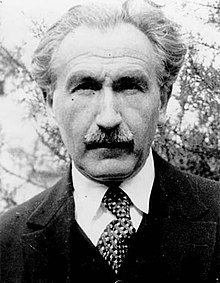Hugo Bergmann

Samuel (Schmuel) Hugo Bergman(n), or Samuel Bergman (Hebrew: שמואל הוגו ברגמן; born: December 25, 1883, Prague, died: June 18, 1975, Jerusalem) was a German and Israeli Jewish philosopher.
Biography
He emigrated to Palestine in 1920, and founded, together with Martin Buber, a movement promoting a "dual-national" area where Jews and Arabs could live under equal conditions.
He translated several of Rudolf Steiner's books about Threefold Social Order to Hebrew.
He became a Professor at the Hebrew University of Jerusalem, and later on the dean of the university. His best friends from Prague to Israel were Franz Kafka, who was a schoolmate of his, the philosopher Felix Weltsch, who later also worked in the University Library of Jerusalem, and Max Brod, who was introduced by Bergman into Zionism as early as before 1910.
He wrote on the nature of quantum mechanics and causality where he interpreted spontanaeity in nature with the psychological idea that the closer we come to elements in nature or components in the individual, the less tenable is strict causal determinism and the more freedom we must grant to decisive personal elements.
"In corresponding areas of physics, the statistical law of averages takes on the same functions in determining temporal position and in prediction and reconstruction that the strict law of causality previously covered, but with the distinction that the individual case could be temporally located and predicted or reconstructed before, whereas now we deal only with the average." (1929)
Awards
- Bergmann was twice a recipient of the Israel Prize:
- in 1954, for the humanities[1]; and
- in 1974 for his special contribution to society and the State of Israel[2].
- He was a recipient of the Yakir Yerushalayim (Worthy Citizen of Jerusalem) award in 1967, the year of the award's inauguration.[3]
Writings
- Miriam Sambursky: Zionist und Philosoph. Das Habilitierungsproblem des jungen Hugo Bergmann. Bulletin des Leo Baeck Instituts 58
- Miriam Sambursky (Hrsg.): Schmuel Hugo Bergmann: Tagebücher und Briefe. Band 1: 1901-1948.
- Dietmar Wiechmann: Der Traum vom Frieden: das bi-nationale Konzept des Brith-Schalom zur Lösung des jüdisch-arabischen Konfliktes in der Zeit von 1925-1933, 1998, ISBN 3-87920-416-0
References
- ^ "Israel Prize recipients in 1954 (in Hebrew)". Israel Prize Official Site. Archived from the original on 11 February 2010 by WebCite®.
{{cite web}}: Check date values in:|archivedate=(help) - ^ "Israel Prize recipients in 1974 (in Hebrew)". Israel Prize Official Site. Archived from the original on 18 February 2010 by WebCite®.
{{cite web}}: Check date values in:|archivedate=(help) - ^ "Recipients of Yakir Yerushalayim award (in Hebrew)". City of Jerusalem official web site
See also
External links
- Jewish philosophers
- Zionists
- Israeli philosophers
- Czech Jews
- Czech-German Jews
- Czech immigrants to Israel
- German Jews
- Israeli Jews
- People from Prague
- Israel Prize in humanities recipients
- Israel Prize in humanities recipients who were philosophers
- Israel Prize for special contribution to society and the State recipients
- Jews in Ottoman and British Palestine
- Hebrew University of Jerusalem faculty
- Members of the Israel Academy of Sciences and Humanities
- Yakir Yerushalayim recipients
- 1883 births
- 1975 deaths
